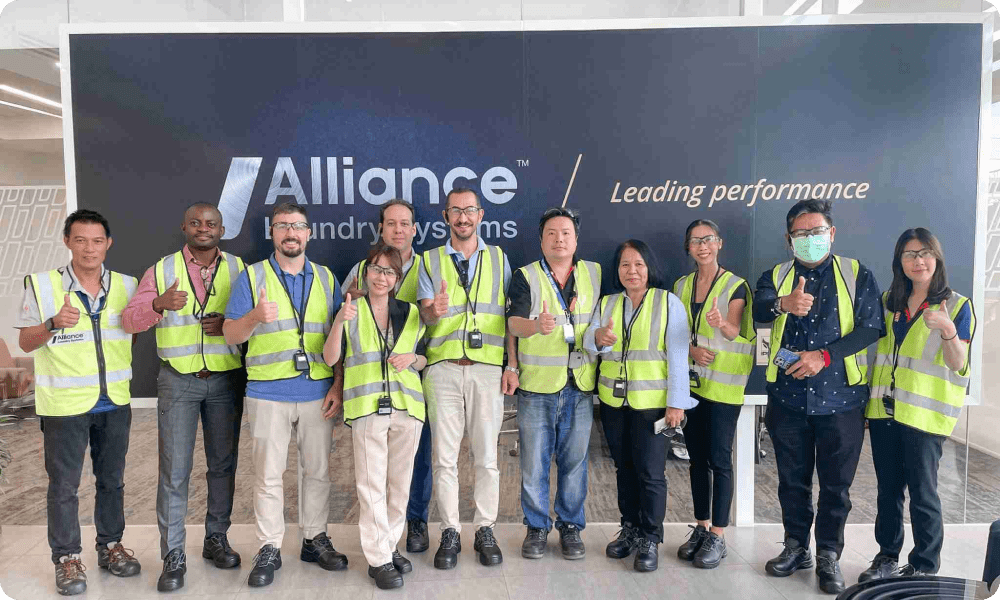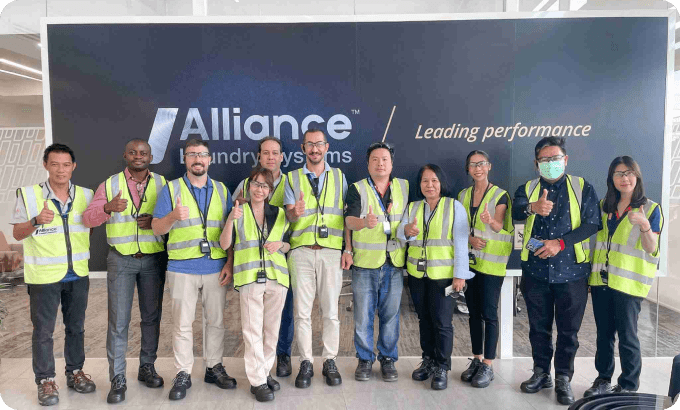Marketplace Regolith
Your investment opportunities
Alliance Laundry Holdings
Manufacturer of commercial laundry equipment
Updated on 15 Dec 2025

Michael D. Schoeb
CEO
“We create reliable equipment trusted by people and businesses. Every day, we help the world stay clean and stable.”

Updated on 15 Dec 2025
Why Alliance Laundry Holdings Is a Must-Have in Your Portfolio
Alliance Laundry Holdings — a leading manufacturer of commercial laundry equipment based in Wisconsin, founded in 1908. The company produces washing and drying machines under the brands Speed Queen, UniMac, Huebsch, Primus, and IPSO, holding roughly 40% of the North American market.
Alliance Laundry plans to raise around $700 million through the sale of 34.2 million shares priced at $19–22 per share, valuing the company at approximately $4.0 billion. The business is owned by BDT & MSD Partners, which previously considered selling the asset for about $5 billion, including debt.
A strong market position and steady demand from laundromats, hotels, and residential complexes support predictable revenue and repeat sales. Proceeds from the IPO will be used to reduce debt and strengthen the balance sheet. Alliance Laundry stands as a reliable industrial leader with over a century of history and consistent growth driven by infrastructure modernization.
Exclusive Participation Terms
The IPO of Alliance Laundry Holdings is considered one of the most anticipated industrial offerings of the fall season. The company is preparing to list on the New York Stock Exchange (NYSE), offering 34.2 million shares at a price range of $19–22 per share, aiming to raise around $700 million at a valuation of approximately $4 billion.
Investor interest is supported by the company’s solid financial profile, strong demand for energy-efficient equipment, and positive outlook for U.S. infrastructure investment. Proceeds from the IPO will be used to reduce debt and strengthen the company’s balance sheet.
Application and funding deadline — Wednesday, October 8, 6:00 PM (UAE).
Key Facts Investors Should Know
• Business scale: A North American market leader with around 40% share and more than a century of operational history.
• Manufacturing footprint: Production facilities and distributors across dozens of countries, supplying equipment under the Speed Queen, UniMac, Huebsch, Primus, and IPSO brands.
• Financial stability: A steady flow of orders from laundromats, hotels, and residential complexes ensures predictable revenue.
• Efficiency: Strong margins driven by scale, service contracts, and parts sales.
• Market trends: Infrastructure modernization and growing demand for energy-efficient equipment support long-term growth.
The Founding and Growth of Alliance Laundry Holdings
Alliance Laundry Holdings is a leading global manufacturer of commercial laundry equipment founded in 1908. Its portfolio includes renowned brands such as Speed Queen, UniMac, Huebsch, Primus, and IPSO.
The company operates in more than 100 countries with a robust international distribution network. In Asia, Alliance Laundry holds up to 70% market share in certain countries and continues to expand its Seed Store format — branded self-service mini-laundries. The model is gaining the most traction in Southeast Asia, particularly in Vietnam, Indonesia, and Cambodia.
According to its IPO filing with the U.S. Securities and Exchange Commission (SEC), Alliance Laundry’s revenue for the first half of 2025 increased by nearly 15% to $836.8 million, while net income declined to $48.3 million due to rising production and logistics costs.
Alliance positions itself as the No. 1 supplier in the global professional laundry equipment market, noting that no competitor matches its scale in sales, product range, or geographic reach.


The IPO of Alliance Laundry Holdings is among the largest industrial offerings of fall 2025. The company aims to raise around $700 million by offering 34.2 million shares at $19–22 per share, valuing the business at approximately $4 billion.
Key risks outlined in the filing include volatility in raw material prices (particularly steel and aluminum), increasing logistics costs, competitive pressure, and foreign exchange fluctuations.
For investors, this IPO represents an opportunity to invest in a mature yet technologically evolving industrial company with a global footprint, steady demand, and solid growth prospects driven by infrastructure modernization and the ongoing shift toward energy-efficient equipment.
Frequently Asked Questions (FAQ)
— What is an IPO?
An IPO (Initial Public Offering) is when a private company lists its shares on a stock exchange for the first time to raise capital from investors. From that point onward, the company’s shares can be freely bought and sold on the open market.
— Where are IPOs conducted?
IPOs take place on the world’s largest stock exchanges. In the U.S., the primary venues are the NYSE (New York Stock Exchange) and NASDAQ. Once a company goes public, its shares are freely traded on these exchanges, and the market price is established after the offering.
— What is allocation?
Allocation (from “allocation” — distribution) refers to the process of distributing resources, assets, or capital for maximum efficiency. In investing, allocation usually means distributing the available amount of shares among investors in an IPO or private placement.
— How much allocation does an investor receive?
The allocation size is determined by the terms of each specific offering and typically ranges from 2% to 30% of the submitted application amount. In some cases, the allocation may reach 100%. In rare instances, no allocation may be granted — in that case, the full amount of the application is returned to the investor’s account and becomes available for reinvestment or withdrawal. Information on the actual allocation volume is usually provided about one day before the IPO, approximately six hours prior to the transaction.
Example — Bullish IPO (Aug 13, 2025):
An investor placed an order for $10,000. The allocation was 29.6%, meaning $2,960 was invested in the IPO. The remaining $7,040, including the purchase commission, was refunded to the balance and became available for withdrawal.Klarna IPO (Sept 10, 2025):
An investor placed an order for $10,000. The allocation was 14%, meaning $1,400 was invested in the IPO. The remaining $8,600, including the purchase commission, was refunded to the balance and became available for withdrawal.Figure IPO (Sept 11, 2025):
An investor placed an order for $10,000. The allocation was 16%, meaning $1,600 was invested in the IPO. The remaining $8,400, including the purchase commission, was refunded to the balance and became available for withdrawal.Gemini IPO (Sept 12, 2025):
An investor placed an order for $10,000. The allocation was 29%, meaning $2,900 was invested in the IPO. The remaining $7,100, including the purchase commission, was refunded to the balance and became available for withdrawal.Legence IPO (Sept 12, 2025):
An investor placed an order for $10,000. The allocation was 78%, meaning $7,800 was invested in the IPO. The remaining $2,200, including the purchase commission, was refunded to the balance and became available for withdrawal.Black Rock Coffee Bar IPO (Sept 12, 2025):
An investor placed an order for $10,000. The allocation was 68%, meaning $6,800 was invested in the IPO. The remaining $3,200, including the purchase commission, was refunded to the balance and became available for withdrawal.
— Why do companies go public?
To raise growth capital, increase brand visibility, and provide early investors and employees with an opportunity to sell part of their shares.
— How is participating in an IPO different from buying shares on the exchange?
When you participate in an IPO, you buy shares before they start trading publicly. This provides an opportunity to purchase at the fixed offering price but also carries the risk that the price may drop once trading begins.
— What do I get by participating in an IPO through Regolith?
You become an investor in the company at the IPO stage via our U.S. partner infrastructure. After the transaction is completed and the lock-up period expires, profits from the share sale are distributed among investors proportionally to their stake in the deal.
— What is a lock-up period and how long does it last?
A lock-up period is a timeframe set by the issuer and underwriters during which shares cannot be sold. For IPOs offered through our platform, this period is 93 days. Once it ends, the shares are sold on the exchange and proceeds are distributed among investors.
— How is participating through the platform different from buying shares independently?
To buy independently, you would need access to a U.S. broker, a significant investment amount, and approval from underwriters. The platform pools capital from investors, providing access to IPOs that are otherwise unavailable to most individuals.
— Through whom is IPO participation carried out?
We operate through a U.S.-based structure that works with a licensed broker in the U.S. Our partner selects promising IPOs and participates in the offering under its own name.
— How is the deal structured legally?
An investor signs an agreement/offer to participate in the investment product. Regolith then transfers funds to its partner entity — Wealthy Labs Limited (the provider), which enters into a forward contract with the broker and executes all operational activities. The provider delivers the financial outcome to Regolith, which then distributes proceeds among investors.
— Is there a minimum investment amount?
Yes. Each IPO has a defined minimum entry threshold, shown on the offering page. On average, Regolith provides access starting from $500.
— Do I receive shares into my personal brokerage account?
No. Shares are purchased and held in the partner’s brokerage account. After the lock-up period, the broker sells the shares and transfers proceeds for distribution among investors.
— Can shares be transferred directly to my brokerage account?
No. Participation is structured via a forward contract with the partner’s brokerage infrastructure. The deal is executed on behalf of the partner, and settlements with investors are carried out through the platform.
— How can I sell my shares after the IPO?
Sales are processed automatically: once the lock-up expires, the partner broker sells the shares on the exchange, and proceeds are distributed proportionally among investors.
— What are the risks of investing in IPOs?
IPOs are high-risk investments. While they may offer high returns, they also carry significant volatility. Share prices on the first trading day — and after the lock-up — can fluctuate sharply. There is a risk that the market price will fall below the offering price. In addition, macroeconomic and sector-specific factors can affect outcomes.
— Can I know in advance how much I will earn?
IPO returns are not guaranteed. The final result depends on the share price at the time of sale after the lock-up, overall market conditions, and the company’s performance.
— How can I verify that Regolith participates in IPOs?
We publish all available deal information in the client dashboard. Additionally, we provide an agreement disclosing the infrastructure used for transactions. Broker and partner documents are not shared, as they contain confidential data protected by contractual obligations.

Michael D. Schoeb
CEO
“We create reliable equipment trusted by people and businesses. Every day, we help the world stay clean and stable.”
Details
Ticker
ALHExchange
NYSEIPO Price Range
$19–22Offering Size
~$700MIPO Valuation
~$4,04BShares Offered
~34,2MUnderwriters
BofA Securities, J.P. Morgan, Morgan Stanley and othersIPO Date
9 Oct 2025Submit by
8 Oct 2025, 6:00 PM (UAE)Terms
Deal Fee
5%Carried Interest
30%Risk potentinal
Very HighLock-up period
93 daysAlliance Laundry Holdings
Manufacturer of commercial laundry equipment
Updated on 15 Dec 2025

Michael D. Schoeb
CEO
“We create reliable equipment trusted by people and businesses. Every day, we help the world stay clean and stable.”

 Русский
Русский 




















